INCOTERMS 2010 贸易术语一览表
- 格式:doc
- 大小:45.50 KB
- 文档页数:7
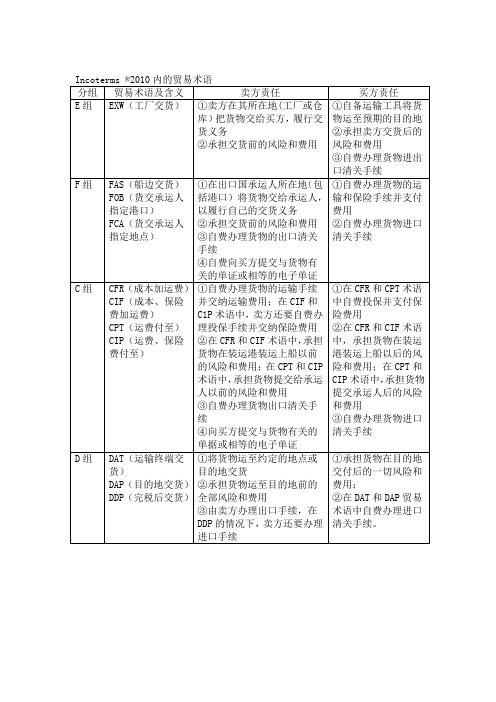
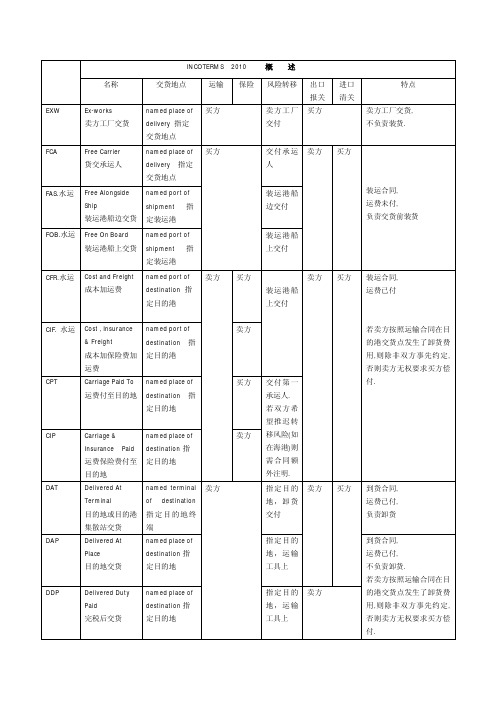
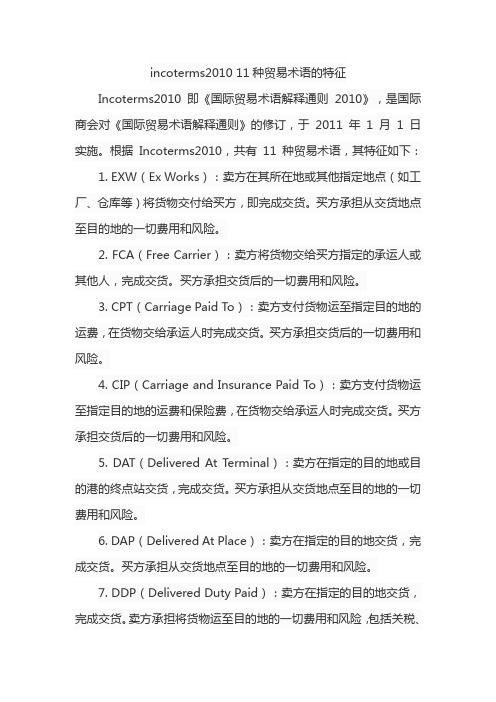
incoterms2010 11种贸易术语的特征Incoterms2010 即《国际贸易术语解释通则2010》,是国际商会对《国际贸易术语解释通则》的修订,于2011 年1 月1 日实施。
根据Incoterms2010,共有11 种贸易术语,其特征如下:1. EXW(Ex Works):卖方在其所在地或其他指定地点(如工厂、仓库等)将货物交付给买方,即完成交货。
买方承担从交货地点至目的地的一切费用和风险。
2. FCA(Free Carrier):卖方将货物交给买方指定的承运人或其他人,完成交货。
买方承担交货后的一切费用和风险。
3. CPT(Carriage Paid To):卖方支付货物运至指定目的地的运费,在货物交给承运人时完成交货。
买方承担交货后的一切费用和风险。
4. CIP(Carriage and Insurance Paid To):卖方支付货物运至指定目的地的运费和保险费,在货物交给承运人时完成交货。
买方承担交货后的一切费用和风险。
5. DAT(Delivered At Terminal):卖方在指定的目的地或目的港的终点站交货,完成交货。
买方承担从交货地点至目的地的一切费用和风险。
6. DAP(Delivered At Place):卖方在指定的目的地交货,完成交货。
买方承担从交货地点至目的地的一切费用和风险。
7. DDP(Delivered Duty Paid):卖方在指定的目的地交货,完成交货。
卖方承担将货物运至目的地的一切费用和风险,包括关税、税款和其他费用。
8. FAS(Free Alongside Ship):卖方在指定的装运港将货物交到船边,即完成交货。
买方承担交货后的一切费用和风险。
9. FOB(Free On Board):卖方在指定的装运港将货物装上买方指定的船只,即完成交货。
买方承担交货后的一切费用和风险。
10. CFR(Cost and Freight):卖方支付货物运至指定目的港的运费,在货物装上船时完成交货。
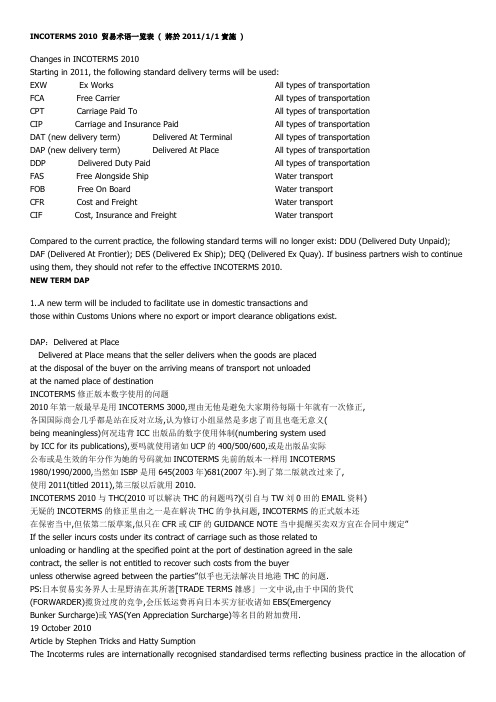
INCOTERMS 2010 贸易术语一览表( 將於2011/1/1實施)Changes in INCOTERMS 2010Starting in 2011, the following standard delivery terms will be used:EXW Ex Works All types of transportationFCA Free Carrier All types of transportationCPT Carriage Paid To All types of transportationCIP Carriage and Insurance Paid All types of transportationDAT (new delivery term) Delivered At Terminal All types of transportationDAP (new delivery term) Delivered At Place All types of transportationDDP Delivered Duty Paid All types of transportationFAS Free Alongside Ship Water transportFOB Free On Board Water transportCFR Cost and Freight Water transportCIF Cost, Insurance and Freight Water transportCompared to the current practice, the following standard terms will no longer exist: DDU (Delivered Duty Unpaid); DAF (Delivered At Frontier); DES (Delivered Ex Ship); DEQ (Delivered Ex Quay). If business partners wish to continue using them, they should not refer to the effective INCOTERMS 2010.NEW TERM DAP1..A new term will be included to facilitate use in domestic transactions andthose within Customs Unions where no export or import clearance obligations exist.DAP:Delivered at PlaceDelivered at Place means that the seller delivers when the goods are placedat the disposal of the buyer on the arriving means of transport not unloadedat the named place of destinationINCOTERMS修正版本数字使用的问题2010年第一版最早是用INCOTERMS 3000,理由无他是避免大家期待每隔十年就有一次修正,各国国际商会几乎都是站在反对立场,认为修订小组显然是多虑了而且也毫无意义(being meaningless)何况违背ICC出版品的数字使用体制(numbering system usedby ICC for its publications),要吗就使用诸如UCP的400/500/600,或是出版品实际公布或是生效的年分作为她的号码就如INCOTERMS先前的版本一样用INCOTERMS1980/1990/2000,当然如ISBP是用645(2003年)681(2007年).到了第二版就改过来了,使用2011(titled 2011),第三版以后就用2010.INCOTERMS 2010与THC(2010可以解决THC的问题吗?)(引自与TW刘0田的EMAIL资料)无疑的INCOTERMS的修正里由之一是在解决THC的争执问题, INCOTERMS的正式版本还在保密当中,但依第二版草案,似只在CFR或CIF的GUIDANCE NOTE当中提醒买卖双方宜在合同中规定”If the seller incurs costs under its contract of carriage such as those related tounloading or handling at the specified point at the port of destination agreed in the salecontract, the seller is not entitled to recover such costs from the buyerunless otherwise agreed between the parties”似乎也无法解决目地港THC的问题.PS:日本贸易实务界人士星野清在其所著[TRADE TERMS雑感」一文中说,由于中国的货代(FORWARDER)揽货过度的竞争,会压低运费再向日本买方征收诸如EBS(EmergencyBunker Surcharge)或YAS(Yen Appreciation Surcharge)等名目的附加费用.19 October 2010Article by Stephen Tricks and Hatty SumptionThe Incoterms rules are internationally recognised standardised terms reflecting business practice in the allocation oftasks,costs and risks in international sales contracts. The ICC has just published the latest version of these rules, Incoterms 2010.The new rules are relevant for those involved in the buying and selling of goods, especially trading companies, exporters and importers, together with those involved in associated services including marine, multimodal transport, logistics and financial services.The new Incoterms 2010 rules enter into force on 1 January 2011. This update outlines the main changes introduced in the new rules.BackgroundIncoterms have been devised and published by the International Chamber of Commerce (ICC) since 1936. The aim of theRules is to facilitate the conduct of global trade by providing clear definitions of the parties' respective obligations, therebyreducing the risk of legal complications.The latest version replaces the 2000 edition and is the culmination of a lengthy process of drafting and consultation involving over 30 national committees and several key trade bodies. The extensive comment and response process resulted in the production of three consultation drafts leading up to the final version of Incoterms 2010.The Incoterms 2010 rules take account of changes in transport practice, together with the spread of customs-free zones, increased use of electronic communication and security issues.The Key Changes:•Consolidation of 'D' TermsThe following rules have been abolished:DAF – Delivered At FrontierDES – Delivered Ex ShipDEQ – Delivered Ex QuayDDU – Delivered Duty UnpaidThe DDP rule (Delivered Duty Paid) is unchanged and is joined by the following new 'D' rules:DAT – Delivered At TerminalThis is intended to replace DEQ with terms more suitable for container transportation. The terms provide for delivery when goods are unloaded from the arriving means of transport and are placed at the disposal of the buyer at the named terminal. An example would be where a container has been unloaded from a ship and placed in the container stack at the port of delivery(?destination?).DAP – Delivered At PlaceThis replaces DES, DAF and DDU and provides for delivery on the arriving means of transport, ready for unloading. An example of likely use would be for delivery by truck to the buyers' premises, or delivered by ship to a named port, not unloaded or import cleared.• Terminal Handling ChargesThe Incoterms 2010 rules seek to clarify the allocation of terminal handling costs between the parties. This is in response to difficulties that have arisen where such costs, although sometimes included in the carriage costs paid by the buyer, havenevertheless been charged to the buyer by the carrier or terminal operator. The new rules are intended to reduce therisk of the buyer being charged twice for terminal handling costs.•InsuranceMinor changes have been made in Incoterms 2010 to those rules that require a party to obtain insurance (CIF and CIP). It is important to note that Incoterms 2010 still requires the seller to obtain only the minimum cover under Institute Cargo 'C' Clauses, or equivalent, on a CIF or CIP transaction. In many cases, the buyer will want to include in the contractan express requirement for the more extensive Institute Cargo 'A' Clauses. For other terms, there are new provisions requiring the parties to exchange information regarding insurance.•Electronic CommunicationIncoterms 2000 provided that certain specified documents could be replaced with Electronic Data Interchange (EDI) messages where the parties agreed to do so. Incoterms 2010 now allow for paper communication to be replaced with an 'equivalent electronic record or procedure' where the parties so agree or where customary. The reference to custom is significant as it means that in certain cases parties will be unable to refuse electronic communication, such as email. •SecurityHeightened international concern about security has resulted in increased clearance requirements relating to the movement of goods. In response, Incoterms 2010 includes provisions that allocate responsibility for obtaining or assisting to obtainclearances between the buyer and seller.• String SalesIn the sale of commodities it is common for cargo to be sold, perhaps several times, during transit. Incoterms 2000 included obligations for a seller to 'ship' the goods but this did not accurately reflect the position of a seller in the middle of a string of transactions who was unable to 'ship' goods that had already been shipped by the first seller. Incoterms 2010 now provides an option, where relevant, to allow the seller to procure goods that have been shipped as an alternative to the obligationto ship the goods.• Domestic and International TradeAlthough Incoterms have traditionally been used in international sale contracts, the ICC has noted that in certain parts of the world trade blocs (such as the EU) have made border formalities between different countries less significant. In addition, there has also been a greater trend towards using Incoterms for purely domestic sale contracts, including in theUnited States. With this in mind, Incoterms 2010 formally recognises that the rules are available for both domestic and international sale contracts and, where appropriate, the rules state that the obligation to comply with export / import formalities exists only where applicable.•General Pointso The Incoterms 2010 rulebook has been reorganised into two classes;'RULES FOR ANY MODE OR MODES♣ OF TRANSPORT' and'RULES FOR SEA AND INLAND WATERWAY♣ TRANSPORT'For rules included in the second class, the point of delivery and the place to which the goods are carried are both ports. FAS, FOB, CFR and CIF all belong to this class. The first class contains the remaining seven Incoterms.o All reference to the 'ship's rail' as the point of delivery has been removed from Incoterms 2010. Instead for FOB, CFR and CIF sales, goods are deemed delivered when they are 'on board' the vessel.o Incoterms 2010 includes clearer guidance notes. These do not form part of the rules but are intended to encourage use of the most appropriate Incoterms rule for any given transaction.CommentIncoterms 2010 introduce changes that reflect developments in international trade practice and regulation and as suchare\ to be welcomed. The new rule book also includes improvements in organisation and guidance information that will be appreciated by users. However, it is essential to note that, as ever, the usefulness of the rules is largely dependent upon the parties selecting the correct Incoterms rule for any given transaction and in ensuring that the rules are properly incorporated into the sales contract. Even when the rule has been selected and incorporated correctly, attention must also be paid to ensuring that other relevant contracts (such as letters of credit, contracts of carriage and insurance) reflect the agreed terms.Finally, parties should always be aware that Incoterms 2010 are not comprehensive and that even where Incoterms ruleshave been properly incorporated, there are additional key provisions that will remain to be agreed by the parties.。
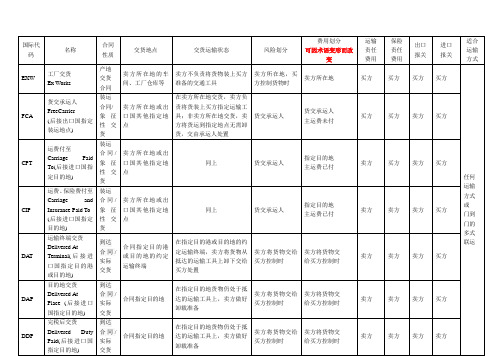
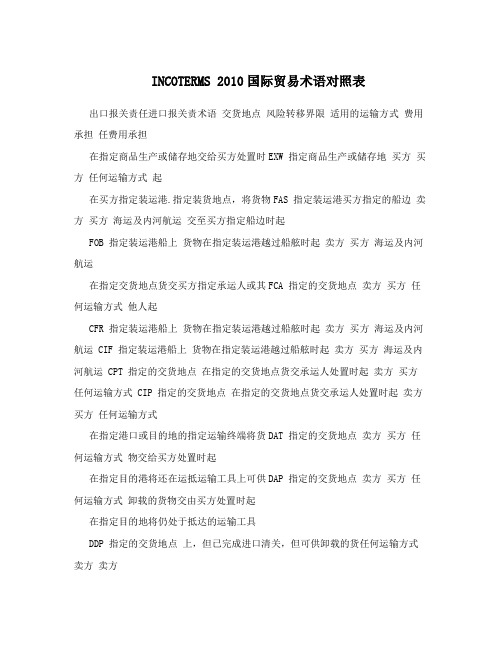
INCOTERMS 2010国际贸易术语对照表出口报关责任进口报关责术语交货地点风险转移界限适用的运输方式费用承担任费用承担在指定商品生产或储存地交给买方处置时EXW 指定商品生产或储存地买方买方任何运输方式起在买方指定装运港.指定装货地点,将货物FAS 指定装运港买方指定的船边卖方买方海运及内河航运交至买方指定船边时起FOB 指定装运港船上货物在指定装运港越过船舷时起卖方买方海运及内河航运在指定交货地点货交买方指定承运人或其FCA 指定的交货地点卖方买方任何运输方式他人起CFR 指定装运港船上货物在指定装运港越过船舷时起卖方买方海运及内河航运 CIF 指定装运港船上货物在指定装运港越过船舷时起卖方买方海运及内河航运 CPT 指定的交货地点在指定的交货地点货交承运人处置时起卖方买方任何运输方式 CIP 指定的交货地点在指定的交货地点货交承运人处置时起卖方买方任何运输方式在指定港口或目的地的指定运输终端将货DAT 指定的交货地点卖方买方任何运输方式物交给买方处置时起在指定目的港将还在运抵运输工具上可供DAP 指定的交货地点卖方买方任何运输方式卸载的货物交由买方处置时起在指定目的地将仍处于抵达的运输工具DDP 指定的交货地点上,但已完成进口清关,但可供卸载的货任何运输方式卖方卖方物交由买方处置时起INCOTERMS 2010的四组贸易术语工厂交货EXW Ex Works,…named place of delivery, E组,起运,货交承运人FCA Free Carrier,…named place of delivery,F组船边交货 FAS Free A longside Ship,…named port of shipment, ,主要运费未付, 船上交货FOB Free on Board,…named port of shipment, 成本加运费CFR Cost and Freight ,…named port of destination ,成本,保险费加运费CIF Cost, Insurance and Freight,…named port of destination, C组运费付至 CPT 运费,保险费付至 ,主要运费已付, CIP Carriage Paid to,…named place of destination ,Carriage, and Insurance Paid to,…named place of destination,运输终端交货DAT Delivered At Terminal,…named terminal at port or placeD组 of destination, 目的地交货 ,到达, DAP Delivered AtPlace ,…named place of destin ation, 完税后交货 DDP Delivered Duty Paid ,…named place of destination,。
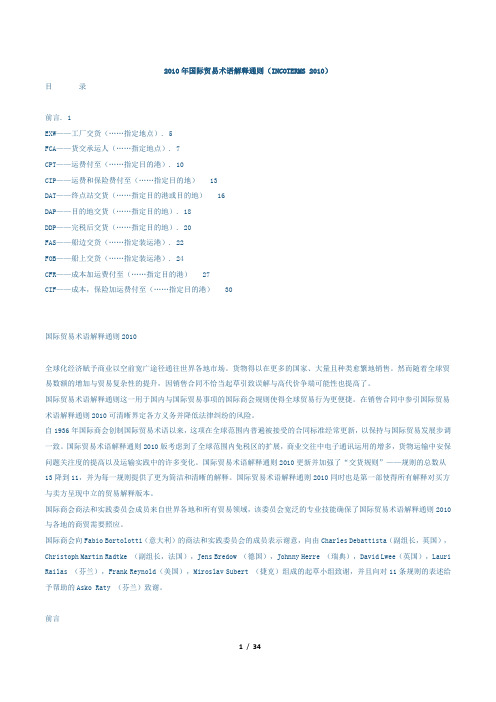
2010年国际贸易术语解释通则(INCOTERMS 2010)目录前言. 1EXW——工厂交货(……指定地点). 5FCA——货交承运人(……指定地点). 7CPT——运费付至(……指定目的港). 10CIP——运费和保险费付至(……指定目的地) 13DAT——终点站交货(……指定目的港或目的地) 16DAP——目的地交货(……指定目的地). 18DDP——完税后交货(……指定目的地). 20FAS——船边交货(……指定装运港). 22FOB——船上交货(……指定装运港). 24CFR——成本加运费付至(……指定目的港) 27CIF——成本,保险加运费付至(……指定目的港) 30国际贸易术语解释通则2010全球化经济赋予商业以空前宽广途径通往世界各地市场。
货物得以在更多的国家、大量且种类愈繁地销售。
然而随着全球贸易数额的增加与贸易复杂性的提升,因销售合同不恰当起草引致误解与高代价争端可能性也提高了。
国际贸易术语解释通则这一用于国内与国际贸易事项的国际商会规则使得全球贸易行为更便捷。
在销售合同中参引国际贸易术语解释通则2010可清晰界定各方义务并降低法律纠纷的风险。
自1936年国际商会创制国际贸易术语以来,这项在全球范围内普遍被接受的合同标准经常更新,以保持与国际贸易发展步调一致。
国际贸易术语解释通则2010版考虑到了全球范围内免税区的扩展,商业交往中电子通讯运用的增多,货物运输中安保问题关注度的提高以及运输实践中的许多变化。
国际贸易术语解释通则2010更新并加强了“交货规则”——规则的总数从13降到11,并为每一规则提供了更为简洁和清晰的解释。
国际贸易术语解释通则2010同时也是第一部使得所有解释对买方与卖方呈现中立的贸易解释版本。
国际商会商法和实践委员会成员来自世界各地和所有贸易领域,该委员会宽泛的专业技能确保了国际贸易术语解释通则2010与各地的商贸需要照应。
国际商会向Fabio Bortolotti(意大利)的商法和实践委员会的成员表示谢意,向由Charles Debattista(副组长,英国),Christoph Martin Radtke (副组长,法国),Jens Bredow (德国),Johnny Herre (瑞典),David Lwee(英国),Lauri Railas (芬兰),Frank Reynold(美国),Miroslav Subert (捷克)组成的起草小组致谢,并且向对11条规则的表述给予帮助的Asko Raty (芬兰)致谢。
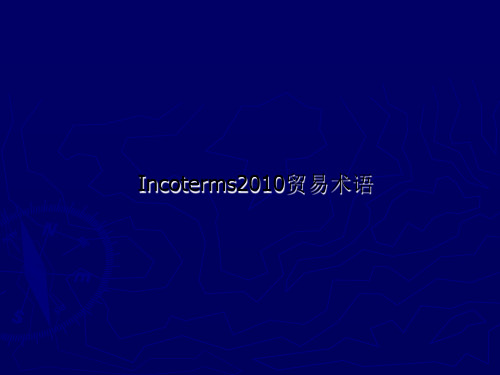
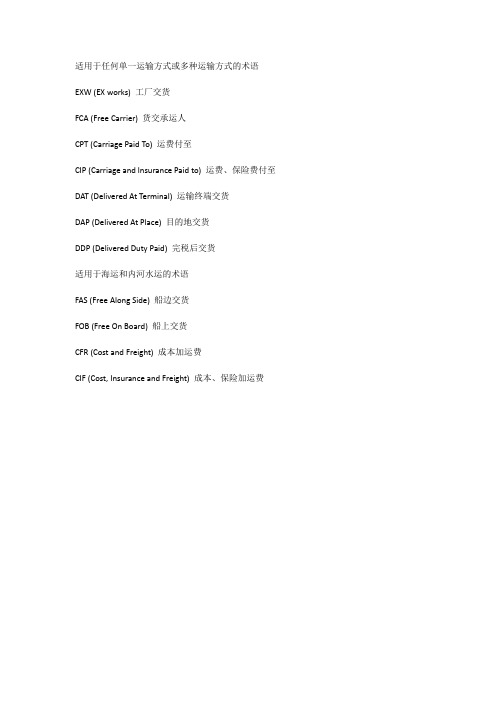
适用于任何单一运输方式或多种运输方式的术语EXW (EX works) 工厂交货FCA (Free Carrier) 货交承运人CPT (Carriage Paid To) 运费付至CIP (Carriage and lnsurance Paid to) 运费、保险费付至DAT (Delivered At Terminal) 运输终端交货DAP (Delivered At Place) 目的地交货DDP (Delivered Duty Paid) 完税后交货适用于海运和内河水运的术语FAS (Free Along Side) 船边交货FOB (Free On Board) 船上交货CFR (Cost and Freight) 成本加运费CIF (Cost, Insurance and Freight) 成本、保险加运费(EX Works工厂交货)该术语可适用于任何运输方式,也可适用于多种运输方式。
它适合国内贸易,而FCA一般则更适合国际贸易。
“工厂交货”是指当卖方在其所在地或其它指定地点(如工厂、车间或仓库等)将货物交由买方处置时,即完成交货。
卖方不需将货物装上任何前来接收货物的运输工具,需要清关时,卖方也无需办理出口清关手续。
特别建议双方在指定交货地范围内尽可能明确具体交货地点,因为在货物到达交货地点之前的所有费用和风险都由卖方承担。
买方则需承担自此指定交货地的约定地点(如有的话)收取货物所产生的全部费用和风险。
EXW(工厂交货)术语代表卖方最低义务,使用时需注意以下问题:a) 卖方对买方没有装货的义务,即使实际上卖方也许更方便这样做。
如果卖方装货,也是由买方承担相关风险和费用。
当卖方更方便装货物时,FCA一般更合适,因为该术语要求卖方承担装货义务,以及与此相关的风险和费用。
b) 以EXW为基础购买出口产品的买方需要注意,卖方只有在买方要求时,才有义务协助办理出口,即卖方无义务安排出口通关。
因此,在买方不能直接或间接地办理出口清关手续时,不建议使用该术语。

INCOTERMS2010中文版INCOTERMS 2010中文版1. 介绍INCOTERMS(国际贸易术语解释规则)是由国际商会(ICC)制定的国际贸易术语规则,用于明确买卖双方在国际货物运输中的责任和义务。
INCOTERMS 2010是由于全球贸易环境的变化而发布的最新版本,共有11个术语,用于规范国际货物交易的常用术语和惯例。
2. EXW(装货港交货)EXW意味着卖方将货物放置在指定的地点,由买方负责所有的运输安排和费用。
在这种术语下,卖方的义务非常有限,买方需要承担所有的进口手续、装卸费用和风险。
3. FCA(运费或运输人接收处交货)FCA表示卖方将货物交给指定的运输人或承运人。
卖方负责将货物交到指定地点,并承担出口清关手续。
买方需要负责进口清关手续、运输保险和费用。
4. CPT(运费支付到目的地)CPT意味着卖方负责将货物运输到目的地,并承担货物运输费用直到目的地。
买方需要负责货物的进口清关手续、保险费用和未列入卖方义务的其他费用。
5. CIP(运费和保险费支付到目的地)CIP与CPT类似,唯一的区别是卖方还需要承担货物运输保险费用。
买方需要负责货物的进口清关手续和未列入卖方义务的其他费用。
6. DAT(到岸价)DAT意味着卖方负责将货物交付到指定目的港口,并承担货物的进口清关手续和支付关税。
买方需要承担货物的卸载费用和将货物送到目的地的费用。
7. DAP(交货地点)DAP表示卖方负责将货物交付到约定的目的地,买方需要承担货物的进口清关手续、卸货费用和将货物送到目的地的费用。
8. DDP(已交税承担)DDP意味着卖方承担所有的责任和费用,包括货物运输、保险、清关和将货物交付到买方指定的目的地。
9. FAS(船上交货)FAS表示卖方将货物交交付给指定的港口,并承担将货物装上船的费用和风险。
买方需要负责运输、装卸费用和风险。
10. FOB(船上交货)FOB意味着卖方负责将货物交付给指定的港口,并承担将货物装上船的费用和风险。
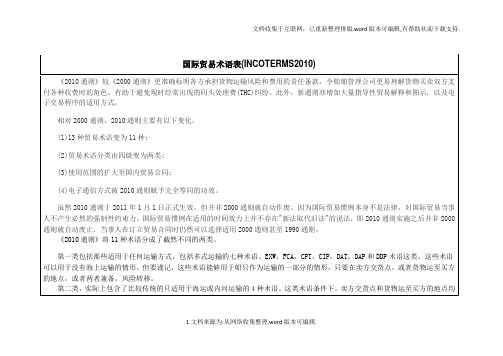
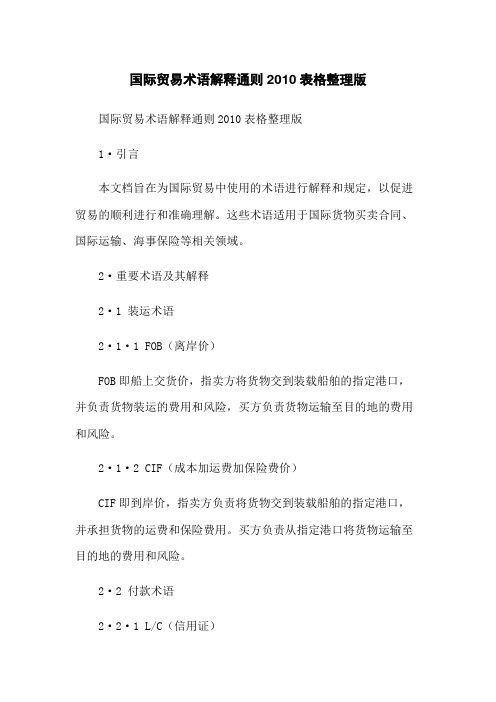
国际贸易术语解释通则2010表格整理版国际贸易术语解释通则2010表格整理版1·引言本文档旨在为国际贸易中使用的术语进行解释和规定,以促进贸易的顺利进行和准确理解。
这些术语适用于国际货物买卖合同、国际运输、海事保险等相关领域。
2·重要术语及其解释2·1 装运术语2·1·1 FOB(离岸价)FOB即船上交货价,指卖方将货物交到装载船舶的指定港口,并负责货物装运的费用和风险,买方负责货物运输至目的地的费用和风险。
2·1·2 CIF(成本加运费加保险费价)CIF即到岸价,指卖方负责将货物交到装载船舶的指定港口,并承担货物的运费和保险费用。
买方负责从指定港口将货物运输至目的地的费用和风险。
2·2 付款术语2·2·1 L/C(信用证)L/C即信用证,是买卖双方约定的支付方式,买方通过银行开立信用证,向卖方承诺在一定时间内按照约定条件支付货款。
卖方在符合信用证规定的条件下,向开证行提供相应的单据以获得货款。
2·2·2 D/P(付款交单)D/P即付款交单,是买卖双方约定的支付方式,卖方将货物的交单和相应单据交给买方,买方在接受单据后支付货款。
3·运输术语及其解释3·1 FCL(整箱运输)FCL即整箱运输,指货物装载在一整箱的货柜中进行运输。
3·2 LCL(拼箱运输)LCL即拼箱运输,指货物装载在与其他货主共享的货柜中进行运输。
4·附件信息本文档涉及的附件包括:●附件1、国际贸易术语解释通则2010全文●附件2、国际贸易术语缩写词表5·法律名词及注释5·1 国际商业惯例(Incoterms)国际商业惯例是国际贸易中使用的术语和规则的统称,由国际商会发布和管理。
5·2 合同法合同法是各国家用于规范合同订立、履行和解决争议的法律规定。
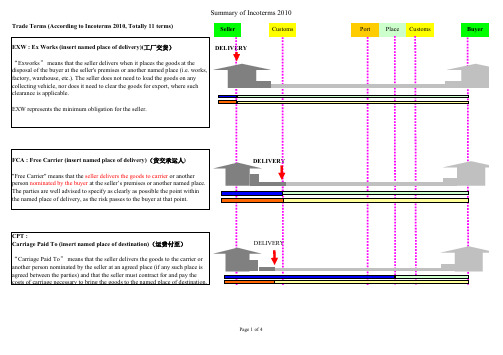
EXW : Ex Works (insert named place of delivery)(工厂交货)“Exworks” means that the seller delivers when it places the goods at the disposal of the buyer at the seller's premises or another named place (i.e. works, factory, warehouse, etc.). The seller does not need to load the goods on any collecting vehicle, nor does it need to clear the goods for export, where such clearance is applicable.EXW represents the minimum obligation for the seller.CIP :Carriage and Insurance Paid to (insert named place of destination)(运费和保险费付至)“Carriage and Insurance Paid to” means that the seller delivers the goods to the carrier or another person nominated by the seller at an agreed place (if any such place is agreed between the parties) and that the seller must contract for and pay the costs of carriage necessary to bring the goods to the named place ofdestination.FAS : Free Alongside Ship (insert named port of shipment)(船边交货)This rule is to be used only for sea or inland waterway transport.“Free Alongside Ship” means that the seller delivers when the goods are placed alongside the vessel (e.g., on a quay or a barge) nominated by the buyer at the named port of shipment. The risk of loss of or damage to the goods passes when the goods are alongside the ship, and the buyer bears all costs from that moment onwards.Note:When CPT , CIP, CFR or CIF are used, the seller fulfils its obligation to deliver when it hands the goods over to the carrier in the manner specified in the chosen rule and not when the goods reach the place of destination . This rule has two critical points,because risk passes and costs are transferred at different places. While the contract will always specify a destination port , it might not specify the port of shipment, which is where risk passes to the buyer. If the shipment port is of particular interest to the buyer,the parties are well advised to identify it as precisely as possible in the contract.CFR : Cost and Freight (insert named port of destination)(成本加运费)This rule is to be used only for sea or inland waterway transport.“Cost and Freight ” means that the seller delivers the goods on board the vessel or procures the goods already so delivered. The risk of loss of or damage to the goods passes when the goods are on board the vessel. The seller must contract for and pay the costs and freight necessary to bring the goods to the named port of destination.CIF : Cost Insurance and Freight (insert named port of destination)(成本、保险费加运费)This rule is to be used only for sea or inland waterway transport.“Cost, Insurance and Freight ” means that the seller delivers the goods on board the vessel or procures the goods already so delivered. The risk of loss of or damage to the goods passes when the goods are on board the vessel.The seller must contract for and pay the costs and freight necessary to bring the goods to the named port of destination.。
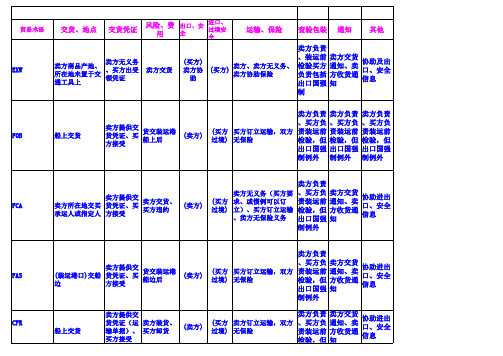

2010年国际贸易术语解释通则(INCOTERMS 2010)目录1.2010年国际贸易术语解释通则(INCOTERMS 2010)1.引言2.EXW3.FCA4.CPT5.CIP6.DAT7.DAP8.DDP9.FAS10.FOB11.CFR12.CIF《2010年国际贸易术语解释通则》中文版 INCOTERMS 2010 (2011年1月第二版)引言适用于任何单一运输方式或多种运输方式的术语EXW (EX works) 工厂交货FCA (Free Carrier) 货交承运人CPT (Carriage Paid To) 运费付至CIP (Carriage and lnsurance Paid to) 运费、保险费付至DAT (Delivered At Terminal) 运输终端交货DAP (Delivered At Place) 目的地交货DDP (Delivered Duty Paid) 完税后交货适用于海运和内河水运的术语FAS (Free Along Side) 船边交货FOB (Free On Board) 船上交货CFR (Cost and Freight) 成本加运费CIF (Cost, Insurance and Freight) 成本、保险加运费EXW(EX Works工厂交货)该术语可适用于任何运输方式,也可适用于多种运输方式。
它适合国内贸易,而FCA一般则更适合国际贸易。
“工厂交货”是指当卖方在其所在地或其它指定地点(如工厂、车间或仓库等)将货物交由买方处置时,即完成交货。
卖方不需将货物装上任何前来接收货物的运输工具,需要清关时,卖方也无需办理出口清关手续。
特别建议双方在指定交货地范围内尽可能明确具体交货地点,因为在货物到达交货地点之前的所有费用和风险都由卖方承担。
买方则需承担自此指定交货地的约定地点(如有的话)收取货物所产生的全部费用和风险。
EXW(工厂交货)术语代表卖方最低义务,使用时需注意以下问题:a) 卖方对买方没有装货的义务,即使实际上卖方也许更方便这样做。

2010年国际贸易术语解释通则(INCOTERMS 2010)目录1. 2010年国际贸易术语解释通则(INCOTERMS 2010)1. 引言2. EXW3. FCA4. CPT5. CIP6. DAT7. DAP8. DDP9. FAS10. FOB11. CFR12. CIF《2010年国际贸易术语解释通则》中文版INCOTERMS 2010 •(2011年1月第二版)引言适用于任何单一运输方式或多种运输方式的术语EXW (EX works) 工厂交货FCA (Free Carrier) 货交承运人CPT (Carriage Paid To) 运费付至CIP (Carriage and lnsurance Paid to) 运费、保险费付至DAT (Delivered At Terminal) 运输终端交货DAP (Delivered At Place) 目的地交货DDP (Delivered Duty Paid) 完税后交货适用于海运和内河水运的术语FAS (Free Along Side) 船边交货FOB (Free On Board) 船上交货CFR (Cost and Freight) 成本加运费CIF (Cost, Insurance and Freight) 成本、保险加运费EXW(EX Works工厂交货)该术语可适用于任何运输方式,也可适用于多种运输方式。
它适合国内贸易,而FCA一般则更适合国际贸易。
“工厂交货”是指当卖方在其所在地或其它指定地点(如工厂、车间或仓库等)将货物交由买方处置时,即完成交货。
卖方不需将货物装上任何前来接收货物的运输工具,需要清关时,卖方也无需办理出口清关手续。
特别建议双方在指定交货地范围内尽可能明确具体交货地点,因为在货物到达交货地点之前的所有费用和风险都由卖方承担。
买方则需承担自此指定交货地的约定地点(如有的话)收取货物所产生的全部费用和风险。
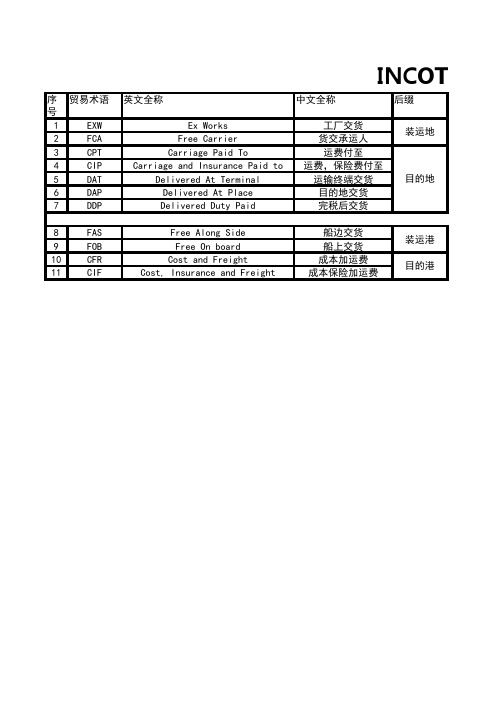
序号贸易术语英文全称中文全称后缀1EXW Ex Works工厂交货
2FCA Free Carrier货交承运人
3CPT Carriage Paid To运费付至
4CIP Carriage and Insurance Paid to运费,保险费付至
5DAT Delivered At Terminal运输终端交货
6DAP Delivered At Place目的地交货
7DDP Delivered Duty Paid完税后交货
8FAS Free Along Side船边交货
9FOB Free On board船上交货
10CFR Cost and Freight成本加运费11CIF Cost, Insurance and Freight成本保险加运费目的港
INCOTER
装运地
目的地
装运港
运输方式
交货地点风险转移界限商品产地、所在地买方处置货物后指定目的港或目的地的运输终端上货交买方后(卸货)买方处置货物后 (未卸货)
买方在指定地点收货后
水运进口国内
出口国内地、港口
*C组交货地点与后缀地点不同,运费付至目的地,货运至装运港/地。
其余交货地点与后缀地点一致。
装运港口货交装运港船上后
承运人处置货物后
OTERMS 2010贸易术语一览表
任何
运输费用
保险费用
出口报关
进口报关
买方
卖方
卖方
卖方
卖方买方
买方
买方
卖方
买方卖方
买方买方
卖方。

2010贸易术语通则表2010贸易术语通则表是指由国际商会(ICC)于2010年发布的《国际贸易术语通则》(Incoterms 2010)。
这是国际商会制定的一套国际贸易术语规则,旨在统一国际贸易中的适用于货物买卖合同的商业术语和定义。
2010贸易术语通则表包括了11个不同的贸易术语,每个术语都有特定的含义和适用范围。
以下是2010贸易术语通则表中的术语:1. EXW(离岸价):卖方将货物交于买方指定的地点,买方需承担一切风险和费用。
2. FCA(离岸价运费支付人):卖方将货物交于指定地点,买方需要自行安排运输并承担相应费用和风险。
3. CPT(运费支付人):卖方承担将货物交至买方指定的地点的费用,买方需承担货物运输的风险。
4. CIP(运费保险付):卖方承担将货物交至买方指定的地点的费用,并提供货物保险。
买方需承担货物运输的风险。
5. DAT(交货地卸货):卖方将货物交至买方指定的目的地的港口或终点站,卸货由买方负责。
6. DAP(交货目的地):卖方将货物交至买方指定的目的地,包括货物的进口清关手续。
7. DDP(交货权转移):卖方负责将货物交至买方指定的目的地,包括所有运输手续和关税。
8. FAS(离岸价船上交货):卖方将货物交至船上指定港口,买方负责之后的运输和费用。
9. FOB(离岸价船上交货):卖方将货物交至船上指定港口,之后的运输由买方负责。
10. CFR(费用运费支付人):卖方承担将货物交至目的港口的费用,买方需承担负责货物的进口清关手续和费用。
11. CIF(费用保险付):卖方承担将货物交至目的港口的费用,并提供货物保险。
买方需承担负责货物的进口清关手续和费用。
以上是2010贸易术语通则表中的术语简介,每个术语都有详细的定义和适用规则,用于规范国际贸易中的货物买卖合同。
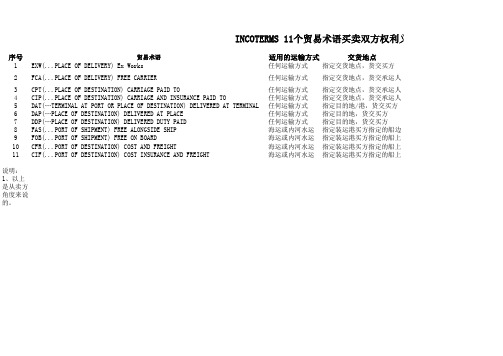
INCOTERMS 11个贸易术语买卖双方权利义务序号贸易术语适用的运输方式交货地点1EXW(...PLACE OF DELIVERY) Ex Works任何运输方式指定交货地点,货交买方2FCA(...PLACE OF DELIVERY) FREE CARRIER任何运输方式指定交货地点,货交承运人3CPT(...PLACE OF DESTINATION) CARRIAGE PAID TO 任何运输方式指定交货地点,货交承运人4CIP(...PLACE OF DESTINATION) CARRIAGE AND INSURANCE PAID TO 任何运输方式指定交货地点,货交承运人5DAT(…TERMINAL AT PORT OR PLACE OF DESTINATION) DELIVERED AT TERMINAL任何运输方式指定目的地/港,货交买方6DAP(…PLACE OF DESTINATION) DELIVERED AT PLACE任何运输方式指定目的地,货交买方7DDP(…PLACE OF DESTINATION) DELIVERED DUTY PAID任何运输方式指定目的地,货交买方8FAS(...PORT OF SHIPMENT) FREE ALONGSIDE SHIP海运或内河水运指定装运港买方指定的船边9FOB(...PORT OF SHIPMENT) FREE ON BOARD海运或内河水运指定装运港买方指定的船上10CFR(...PORT OF DESTINATION) COST AND FREIGHT海运或内河水运指定装运港买方指定的船上11CIF(...PORT OF DESTINATION) COST INSURANCE AND FREIGHT海运或内河水运指定装运港买方指定的船上说明:1、以上是从卖方角度来说的。
2、风险和费用划分不一致的是C组术语(CPT CIP CFR CIF),其他的术语都一致(EXW FCA DAT DAP DDP FAS FOB)3、运输负责人:卖方:CPT CIP DAT DAP DDP CFR CIF; 买方:EXW FCA FAS FOB4、保险负责人:卖方:CIP DAP CIF; 买方:EXW FCA CPT DAT DAP DDP FAS FOB CFR。
INCOTERMS 2010引言国际贸易术语是一种将商业惯例反映在货物销售合同中的价格术语,其描述了涉及货物从卖方到买方交付过程中的买卖双方各自承担的主要责任、费用和风险。
如何应用国际贸易术语2010通则2010 Incoterms 2010 in the income lessen over in the application, users should be explicit:总结Incoterms 2010在销售合同中的应用,使用者应明确:1 对其合同的而言,此通则并不是自动适用的,具有任意性。
对于合同各方当事人意欲任何一种2010通则中的国际贸易术语适用其合同的情形,其应当在合同中清楚具体地订明,通过诸如“所用术语,选择于2010通则”等语句。
2 此通则并不包含一整套的合同条款。
因此,比如,尽管通则中规定当何方当事人承担运费或作保险安排,什么时候卖方将货物交给买方以及各方当事人应承担何种费用,但是通则中并未涉及到有关货物价格和所有权,或者违反合同约定的后果等内容。
这些问题通常是通过合同中相关明示条款或者专门管辖合同的法律来解决。
同样地,当事人应当清楚当地强制性的法律较包括所选贸易术语在内的合同中的任何规定都具有优先权。
3 选择适当特定的术语。
所选术语需要适合于标的货物,运输方式,而且最重要的是要适合于各方当事人是否有意将更多的责任赋予到卖方或买方,比如安排运输或保险的责任。
每种术语的指南中包含一些特别有用的关于何时作出这些选择的信息。
然而,包含在指南中的信息并不构成所选术语的一部分。
4 只有各方当事人指定地点或港口,所选术语才形成有效的,而且指定的地点或港口越精确越奏效。
如以下的精确描述就是一个很好的例子:“FCA (38 Cours Albert 1er, Paris, France) Incoterms 2010”.(2010通则FCA术语,法国巴黎,38 Cours Albert 1er)指定地点是交货点,即风险转移给买方的点;但是在C组术语中,指定地点指的是运费已付的地点。
为了更好避免疑问和争议,指定地点或目的地可以进一步阐述为一个精确的点。
INCOTERMS 2010 贸易术语一览表( 將於2011/1/1實施) Changes in INCOTERMS 2010Starting in 2011, the following standard delivery terms will be used:EXW Ex Works All types of transportationFCA Free Carrier All types of transportation CPT Carriage Paid To All types of transportationCIP Carriage and Insurance Paid All types of transportation DAT (new delivery term) Delivered At Terminal All types of transportation DAP (new delivery term) Delivered At Place All types of transportation DDP Delivered Duty Paid All types of transportationFAS Free Alongside Ship Water transport FOB Free On Board Water transportCFR Cost and Freight Water transportCIF Cost, Insurance and Freight Water transport Compared to the current practice, the following standard terms will no longer exist: DDU (Delivered Duty Unpaid);DAF (Delivered At Frontier); DES (Delivered Ex Ship); DEQ (Delivered Ex Quay). If business partners wish to continueusing them, they should not refer to the effective INCOTERMS 2010Incoterms 2010 will be used from Jan 01, 2011.Starting in 2011, the following standard delivery terms will be used:EXW Ex Works All types of transportationFCA Free Carrier All types of transportationCPT Carriage Paid To All types of transportationCIP Carriage and Insurance Paid All types of transportationDAT (new delivery term) Delivered At Terminal All types of transportationDAP (new delivery term) Delivered At Place All types of transportationDDP Delivered Duty Paid All types of transportationFAS Free Alongside Ship Water transportFOB Free On Board Water transportCFR Cost and Freight Water transportCIF Cost, Insurance and Freight Water transportCompared to the current practice, the following standard terms will no longer exist: DDU (Delivered Duty Unpaid);DAF (Delivered At Frontier); DES (Delivered Ex Ship); DEQ (Delivered Ex Quay). Ifbusiness partners wish to continueusing them, they should not refer to the effective INCOTERMS 2010.2000通则和2010通则的主要区别1 一种新的术语——DPA通则已经将13种不同的术语减为11种。
这是由一种新的术语,DAP,地点交货,取代DAF,DES和DDU而实现的。
所谓DAP术语,就像被取代的那些术语,是“实质性交货”术语,在将货物运至目的地过程中涉及的到所有费用和风险由卖方承担。
此术语适用于任何运输方式,因此也适用于各种DAF,DES 以及DDU以前被使用过的情形。
2 11种贸易术语的分类2000通则中的13种术语按术语缩写首字母分成四组,即,E组(EXW),F组,C组以及F组。
这种分类反映了卖方对于买方的责任程度。
FCA,或者适用国内贸易的EXW,利用交货的完成以及在尽可能早的时间把风险转移给买方从而赋予卖方最少的责任。
相反地,D组术语,或者说“实质性交货”术语,利用交货的完成以及在尽可能晚的时间把风险转移给买方从而赋予卖方最多的责任。
这种分类仍然很重要,尤其是在当事人对2010通则中的中11种贸易术语作出选择时。
然而,2010通则将这11种术语分成了截然不同的两类。
第一类包括那些适用于任何运输方式,包括多式运输的六种术语。
EXW,FCA,CPT,CIP,DAP和DDP术语这类。
这些术语可以用于没有海上运输的情形。
但要谨记,这些术语能够用于船只作为运输的一部分的情形,只要卖方交货点,或者货物运至买方的地点,或者两者兼备,在船舷前面。
第二类,实际上包含了比较传统的只适用于海运或内河运输的5种术语。
这类术语条件下,卖方交货点和货物运至买方的地点均是港口,所以“唯海运不可”就是这类术语标签。
FAS,FOB,CFR,CIF和DEQ属于本类术语。
3 国内和国际贸易术语贸易术语在传统上被运用于表明货物跨越国界传递的国际销售合同。
然而,世界上一些地区的大型贸易集团,像东盟和欧洲单一市场的存在,使得原本实际存在的边界通关手续变得不再那么有意义。
因此,2010通则的编撰委员会认识到这些术语对国内和国际销售合同都是适用的;所以,2010通则在一些地方作出明确说明,只有在适用的地方,才有义务遵守出口/进口所需的手续。
两方面的发展使国际商会确信在这个方向上作一个改动是适时的。
首先,一个强有力的证据就是事实上很多交易者将通则普遍运用于纯粹的内贸合同。
另一个原因就是在美国人们更愿意选择通则而不是统一商法典装运和交货条款运用于国内贸易。
4 使用指南每一种2010通则中的术语在其条款前面都有一个使用指南。
指南解释了每种术语的基本原理:何种情况应使用次术语;风险转移点是什么;费用在买卖是如何分配的。
这些指南并不是术语正式规则的一部分:它们是用来帮助和引导使用者准确有效地为特定交易选择合适的术语。
5 电子通讯通则的早期版本已经对需要的单据作出了规定,这些单据可被电子数据交换信息替代。
不过现在2010通则赋予电子通讯方式完全等同的功效,只要各方当事人达成一致或者在使用地是惯例。
在2010的生命期里,这一规定有利于新的电子程序的演变发展。
6 保险2010通则是自全协会货物保险条款修改以来的第一个版本,这个最新版本在所修改内容中充分考虑了这些保险同款的变动。
2010通则在涉及运输和保险合同的A3/A4条款中罗列了有关保险责任的内容,原本它们属于内容比较泛化而且有着比较泛化标题“其他义务”的A10/B10款。
在这方面,为了阐明当事人的义务,对A3/A4款中涉及保险的内容作出修改。
7 有关安全的核准书及这种核准书要求的信息如今对货物在转移过程中的安全关注度很高,因而要求检定货物不会因除其自身属性外的原因而造成对生命财产的威胁。
因此,在各种术语的A2/B2和A10/B10条款内容中包含了取得或提供帮助取得安全核准的义务,比如货物保管链。
8 码头装卸费按照“C”组术语,卖方必须负责将货物运输至约定目的地:表面上是卖方自负运输费用,但实际上是由买方负担,因为卖方早已把这部分费用包含在最初的货物价格中。